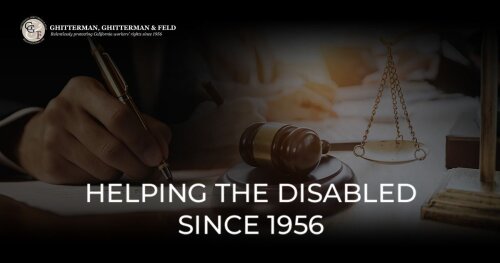Best Sexual Harassment Lawyers in Vermont
Share your needs with us, get contacted by law firms.
Free. Takes 2 min.
Or refine your search by selecting a city:
List of the best lawyers in Vermont, United States
About Sexual Harassment Law in Vermont, United States
Sexual harassment is a form of unlawful discrimination that affects workplaces, schools, and other environments in Vermont. Both state and federal laws provide protections for individuals who experience sexual harassment, focusing on creating safe and respectful environments. Sexual harassment in Vermont covers a spectrum of behaviors, including unwelcome sexual advances, requests for sexual favors, and other verbal or physical conduct of a sexual nature. The law applies to employees, students, tenants, and others in protected settings, aiming to prevent, address, and remedy harm caused by harassing conduct.
Why You May Need a Lawyer
People facing sexual harassment may benefit from legal guidance to understand their rights and options. You may need a lawyer if you are experiencing harassment at work, school, or in housing, or if you are accused of harassment. A lawyer can help document incidents, communicate with your employer or institution, ensure your complaint is handled appropriately, and represent you in legal proceedings. Legal support is also crucial if you face retaliation for reporting harassment, need advice on settlement offers, or want to file a complaint with state or federal agencies.
Local Laws Overview
Vermont law offers robust protections against sexual harassment. State statutes, including the Vermont Fair Employment Practices Act (FEPA), prohibit sexual harassment in the workplace and other settings. These laws apply to employers of all sizes, schools, landlords, and other entities. Vermont’s legal standards often provide broader protections than federal law, with a lower threshold for pursuing claims, shorter timelines for investigation, and specific requirements for employers to have anti-harassment policies, training, and clear reporting procedures. Retaliation against individuals who report or oppose sexual harassment is strictly forbidden. The Vermont Human Rights Commission and the Attorney General’s Office play key roles in enforcing these laws.
Frequently Asked Questions
What is considered sexual harassment in Vermont?
Sexual harassment includes unwelcome sexual advances, requests for sexual favors, or other verbal or physical behavior of a sexual nature that creates a hostile, intimidating, or offensive environment, or affects employment or education decisions.
Does Vermont’s law apply to all employers?
Yes. Vermont law prohibits sexual harassment in workplaces of all sizes, as well as in schools, housing, and public accommodations. There is no minimum number of employees required for coverage.
Who can file a sexual harassment complaint?
Any employee, student, tenant, or individual who experiences or witnesses sexual harassment in the covered settings may file a complaint with the appropriate authority.
What should I do if I experience sexual harassment at work or school?
Document the behavior, notify your employer or school administrator according to published policies, and consider seeking legal advice if you feel your concerns are not addressed or you face retaliation.
Can I be fired or disciplined for reporting sexual harassment?
No. Retaliation against a person for reporting sexual harassment or participating in an investigation is illegal under Vermont and federal law.
Is sexual harassment only about physical contact?
No. Sexual harassment can include verbal or written comments, gestures, emails, sexual jokes, or pictures, as well as non-physical or suggestive conduct.
How long do I have to file a complaint?
Vermont law generally allows up to 300 days from the date of the last incident to file a complaint with the Human Rights Commission or other enforcement agencies. Federal deadlines may vary.
What types of remedies are available in sexual harassment cases?
Victims may be entitled to remedies such as reinstatement, back pay, compensatory or punitive damages, attorney’s fees, and policy changes by the employer or institution.
Can I file a complaint anonymously?
It may be possible to raise concerns anonymously within some organizations, but for official investigations, your identity may become known to people involved in the process.
Where can I get help if I am unsure about what to do?
You can seek guidance from local advocacy groups, the Vermont Human Rights Commission, legal aid organizations, or experienced employment or civil rights attorneys.
Additional Resources
If you or someone you know needs more information or assistance regarding sexual harassment in Vermont, consider reaching out to these resources:
- Vermont Human Rights Commission
- Vermont Attorney General’s Civil Rights Unit
- Vermont Legal Aid
- Vermont Network Against Domestic and Sexual Violence
- U.S. Equal Employment Opportunity Commission (EEOC)
- Local law enforcement for immediate safety concerns
Next Steps
If you believe you have experienced or witnessed sexual harassment, start by documenting incidents, saving any relevant communications, and reviewing your employer’s or school’s anti-harassment policies. Make a formal report to the appropriate authority within your workplace, school, or housing provider. If your concerns are not addressed, or you experience retaliation, consider consulting with an attorney who specializes in employment or civil rights law. An attorney can evaluate your case, explain your legal options, and help you pursue remedies through state agencies or the courts. Acting promptly helps ensure your rights are protected and improves your chances for a favorable outcome.
Lawzana helps you find the best lawyers and law firms in Vermont through a curated and pre-screened list of qualified legal professionals. Our platform offers rankings and detailed profiles of attorneys and law firms, allowing you to compare based on practice areas, including Sexual Harassment, experience, and client feedback.
Each profile includes a description of the firm's areas of practice, client reviews, team members and partners, year of establishment, spoken languages, office locations, contact information, social media presence, and any published articles or resources. Most firms on our platform speak English and are experienced in both local and international legal matters.
Get a quote from top-rated law firms in Vermont, United States — quickly, securely, and without unnecessary hassle.
Disclaimer:
The information provided on this page is for general informational purposes only and does not constitute legal advice. While we strive to ensure the accuracy and relevance of the content, legal information may change over time, and interpretations of the law can vary. You should always consult with a qualified legal professional for advice specific to your situation.
We disclaim all liability for actions taken or not taken based on the content of this page. If you believe any information is incorrect or outdated, please contact us, and we will review and update it where appropriate.
Browse sexual harassment law firms by city in Vermont
Refine your search by selecting a city.










